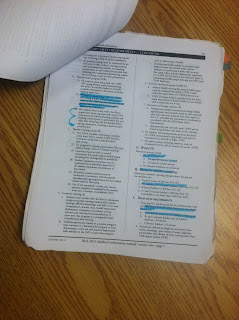Today's lesson from skydiving: Study Like Your Life Depends on It!
 |
| My marked-up SIM |
It may very well depend on it one day (your life, that is, may depend on what you have studied). How do you think MacGyver was always implementing just-in-time solutions to get out of jams?
When I prepare for a jump as an AFF student, I:
How I "Study" for Skydiving
When I prepare for a jump as an AFF student, I:
- Read the SIM to be sure that I understand the learning objectives for that category, as well as to be sure that I am aware of the dive flow and the canopy dive flow.
- Reread the SIM for that category, highlighting important parts of the text.
- Take notes from the highlighted material, rewriting the information on notecards.
- Study the notes I have taken on these notecards, highlighting the most important information on them.
- Mentally rehearse the entire jump from door to ground several times a day.
- Physically rehearse the entire jump as much as possible: practicing in the mock up of the door, rehearsing cutaway procedures and so forth.
The steps above really encapsulate the way I have always studied for most things, minus numbers five and six of course.
Like My Life Depends on It
I feel that the more things I know about skydiving (freefall, canopy piloting), the more likely it is that my brain will be able to access just the right information in time if needed. For example, I opened in line twists a few weeks ago. No big deal, although it can be pretty frightening at first. But we are taught in ground school to just kick out of those twists, much like you would kick your feet to untwist a tangled swing. Because I knew what to do, I was able to very calmly do what was needed without freaking out. I never know what piece of information will be the one thing that I most needed to land without incident; therefore, I study like my life depends on it (because it does).
I recently saw a student skydiver panic as she came closer to the ground. I could tell that all rational thought had left her and she didn't know what to do. I don't ever want to be that person.
However, my students, for the most part, do not put much effort at all into studying and learning. They passively absorb what sticks and hope for the best. That's not good enough. How can we make the stakes higher? Standardized testing is not the answer. How do we make them understand that their lives really do depend on it, at least metaphorically?
Thoughts welcomed.
I recently saw a student skydiver panic as she came closer to the ground. I could tell that all rational thought had left her and she didn't know what to do. I don't ever want to be that person.
However, my students, for the most part, do not put much effort at all into studying and learning. They passively absorb what sticks and hope for the best. That's not good enough. How can we make the stakes higher? Standardized testing is not the answer. How do we make them understand that their lives really do depend on it, at least metaphorically?
Thoughts welcomed.